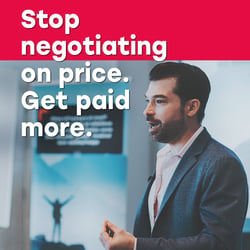How often do B2B sales leads refer to you as a vendor? How much does it make you want to explode because you know well that you’re far from a vendor? Rather, you’re an expert in your field.
Being seen as a vendor is the equivalent of being an amusement park gift-shop owner: While potential customers check your knick-knacks out, they simply browse and then head straight for the door.
However, what if I told you that you can change the way that your leads perceive you? More specifically, you can make them see you as an irreplaceable expert!
That said, we’re sharing exactly how you can change your lead’s perspective of you from a disposable vendor to an irreplaceable expert.
Unless you alter their perception to see you as an expert:
- Leads will waste your time, energy, and money;
- Your sales cycle will be exceedingly long; and
- You’ll close a fraction of the deals that you’re capable of closing.
Here’s exactly how to start being seen and referred to as the expert you are.
Here’s How to Be Seen as an Expert By Your B2B Leads
Is there anything sweeter than having a prospect tell you that you’re the expert and that they trust your expertise?
No... No there is not!
If you’re tired of being seen as an expert instead of a vendor or simply want to close more leads in less time, then turning the tide is 100% in your power.
Here’s exactly how to finally be viewed as an irreplaceable expert:
-Mar-17-2022-12-12-52-79-AM.jpg?width=900&name=1%20(1)-Mar-17-2022-12-12-52-79-AM.jpg)
Taking Control During Lead Generation
To begin with, the primary reason why B2B sales leads see you as a vendor is because you completely give up your control over the selling process. More than that, you place the control on a silver platter and hand it over to leads!
By control, we don’t mean acting like a control freak who is consumed by their own desires. Rather, we mean exercising authority over the selling process so that it goes in the right direction.
Think of being in control as a salesperson like being in control as a doctor. When patients walk into your office, you’re the one in control because you’re the expert. You understand that in order for the patient to feel better, you must stay in control because you know what’s best.
While you might think you’re being “nice” by letting prospects take control, you’re only setting yourself up to be seen as a vendor, get ghosted, and eventually lose the lead.
Potential Customers Don’t Understand Their Pain Points
Would you believe me if I told you that even your most qualified leads don’t have a clue what their pain points are or how to solve them?
It’s the hard truth!
Unfortunately, many salespeople willingly hand over control of the sales process because they believe that their leads know best. They think to themselves, “If I just let the lead take control for a minute they’ll tell me what they need.”
Not only is this logic completely flawed, but it directly causes leads to see you as a vendor.
Let’s return to the doctor analogy: When you visit a doctor for knee pain, do they ask you what your problem is and how you think it needs to be fixed? Or, do they ask questions and then tell you what the problem is and how to fix it?
Remember, prospects don’t know anything about their problems, so letting them take control of the sales process is like asking for them to drive both you and themselves over a cliff.
Asking More Questions
Do you ever feel like you’re on defense during the selling process? Or, do you ever feel like you’re standing at center stage under a bright light with leads judging you?
If so, it’s probably because you’re taking a sales-rep-centric sales approach. By that, we mean that you’re doing most of the talking instead of letting prospects do the talking! More specifically, you’re letting yourself be questioned instead of you questioning prospects.
As a result, prospects see you as a vendor and themselves as the expert.
Think about it. When a detective sits a suspect down, who is doing most of the questioning? If the detective is any good, they’re the ones asking the questions because asking questions establishes their authority and keeps them in control while putting the suspect under the spotlight.
If the detective was to all of a sudden allow themself to be questioned, then the suspect would automatically think that the detective is weak.
Just like how detectives assert authority and affirm their expert status by asking questions, you need to do the same with leads.
The Sales Process Is About Understanding Customers
Instead of having a sales-rep-centric sales approach, adopt a customer-centric sales approach. The simple way to do that is by asking more questions.
At the end of the day, the purpose of the business-to-business selling process is to understand customers. When you understand customers, you know what they need and how much they need it.
From now on, think of yourself in the selling process as a doctor who is trying to get to the bottom of their patient’s problem: You ask questions to try and uncover:
- The root cause of the issue;
- How bad the issue is; and
- What kind of toll the issue is taking.
Once you have firm answers to these questions, you’re ready to offer the lead a diagnosis and propose solutions.
What Is Your Prospect's Ultimate Desired Outcome?
Understanding new leads is about more than understanding what their pain points are and how they affect them. On top of that, it’s about understanding how and why solving the pain point will bring the lead closer to their ultimate desired outcome or vision.
Just like how you created your business in order to manifest a specific vision, so did your customers! Ultimately, that unique vision is central to everything any B2B business does.
That said, don’t you think that understanding your lead’s vision is extremely important to addressing the pain point? On top of that, don’t you think that appealing to their vision will make them see you as somebody who cares deeply about their success?
Of course you do!
Therefore, from the very start of sales lead generation, start honing in on your prospect’s vision. By doing so, they’ll see you as an expert who cares about their success beyond just solving a single pain point.
High-Quality Inbound Marketing
When it comes to a marketing strategy, many B2B sales and marketing teams completely shoot themselves in the foot. Specifically, they completely botch their B2B marketing strategy in a way that causes leads to see view them as a vendor by:
- Putting out a lot of low-grand content marketing;
- Not incorporating a brand message.
First off, inbound marketing content is a quality game, not a quantity game! There are dozens of inbound marketing tactics, including search engine optimization (SEO), social media platform marketing, and email marketing to name a few... However, just because there are dozens of options out there doesn’t mean that you need to go HAM on all of them. If going HAM means that your marketing campaign quality drops, then you’re doing it wrong.
Secondly, every B2B company has a message to send. That message usually points back to their vision. Unless you have a message to send, then what’s the point of putting out content to begin with? If the content doesn’t have an underlying message, then it serves no purpose.
By putting out overall shoddy inbound marketing content, B2B leads will start to see you as a cheap vendor versus a high-quality expert.
Making a Clear Statement
B2B companies and their decision-makers want to buy from people, not companies.
Therefore, you need to start thinking about your company as an individual with its own unique persona versus a stone-cold business.
To do so, start by asking these questions:
- If my business was a person, what would it say?
- If my business was a person, how would it talk/act?
- If my business was a person, why would it do what it does?
When you have answers to these questions, then you have a better idea of what your business persona is.
Once you’ve got that persona on lock, you can integrate it throughout your inbound marketing content. As a result, leads will resonate with your business on a personal level.

Being Straightforward
Here’s the thing: It is sometimes very difficult to hear the hard truth. For example, have you ever had a friend confront you about your bad behavior, and hearing it stung a little bit? However, while the short-term sting was certainly painful, you were thankful for their correction, because you see it as a sign that they care about you and want you to be successful in the long term.
Just like how your friends want the direct truth, so do your sales leads. When it comes to their pain points, they want to know the hard truth of the situation. Even though it might sting, they want the full truth.
However, many sales teams often do the exact opposite of being honest. Thinking that telling the full truth will turn leads off, they beat around the bush a little bit.
For example, instead of telling leads the true depth of their pain point, they soften things up a little. In their mind, softening the blow will make the prospect more likely to want to work with them.
In the end, not being straightforward totally backfires. In a little time, leads will realize that you weren’t being completely transparent and will start to resent you.
Wouldn’t an expert doctor tell you the hard truth of a situation, regardless of how hard it is to initially hear?
No Beating Around the Bush
As we mentioned above, if you’re not 100% transparent with leads, then they’ll eventually find out and start to resent you.
Moreover, if you want to build trust with prospects, then you must not beat around the bush.
Only unconfident vendors who don’t really care about guiding their leads to a better place would beat around the bush!
Therefore, stop vendor-ifying yourself by not telling the full truth. In the end, it'll come back to bite you.
Keeping the Selling Process Short & Sweet
On one hand, vendors don’t really know what exactly they need to do to close deals with leads. Because they don’t actually know what they’re doing, the selling process turns into an exceedingly long ordeal. This sends a clear signal to prospects that the suspected vendor is, in fact, a vendor.
On the other hand, experts know exactly what it takes to close deals with leads. Because they know exactly what it takes, the sales cycle is naturally short and sweet! This sends a clear signal to prospects that the sales rep is a trustworthy expert!
The longer your sales process, the more likely leads are to see you and treat you as a vendor. Instead of spending months on end trying to close the deal, keep it simple.
While you might think that the selling process should be a long process, that is nothing but a misconception! Only sales reps who want to vendor-ify themselves should elongate and overcomplicate their process.
The Shorter & Sweeter the Better
Take a moment to put yourself in your lead’s shoes... If you were them, wouldn’t you want to spend as little time in the sales pipeline as possible? The moment you realize that you have a clear pain point, don’t you want to cut to the chase to start solving it?
Not only do sales reps despise unnecessarily long and complex processes, so do leads!
Therefore, don’t make leads or your sales team miserable by spending months on end trying to close the deal! Instead do these things to instantly make your selling process shorter and sweeter:
- Doing follow-up calls and emails within 24 hours of the initial outreach attempt;
- Following our tips to cut your selling process down to a few weeks; and
- Ditching your sales funnel as a model for your sales process.
Don’t put leads (or yourself) through the misery of a long process. It’ll only make them see you as a vendor.
Leaning Into Your Genuine Personality
Believe it or not, sales leads don’t want to work with robots! Seriously, they don’t want to work with a supposed sales professional who has zero personality.
Why?
Because, leads know that they’re going to be working with sales reps for the long-term, so they want to be sure that they’re the kind of people who they want to have a solid customer relationship with!
The hard truth is that you should want to have solid customer relationships because they can lead to exceptional perks such as consistent referrals for already qualified leads.
That said, don’t be afraid to lean into your genuine personality through the selling process! By doing so, leads will see you as someone who they want to have a relationship with. More importantly, they’ll see you as an expert who isn’t afraid to show off their true self.
Additionally, find ways to interject your personality through inbound marketing content, such as by hosting a webinar or podcast, writing white papers, or featuring yourself on your landing page.
Showing Up Totally Prepared
Would you show up for an exam having not studied for it and still tell yourself that you’re going to ace it? Hopefully not...
If you’re not the kind of person who would show up to a test unprepared while thinking that you’ll ace it, then don’t be the sales rep who shows up to sales pitches being totally unprepared!
Just like how you study information for exams, you need to study your prospects and prepare for possible objections before even thinking about making an initial pitch.
If you’re unprepared, you will likely:
- Feel nervous and show it in your body language and speech;
- Not know how to respond to your lead’s questions or objections; and
- Not know what information you need to uncover about the lead.
Which part of this makes you think that the lead will see you as an expert?
The simplest thing you can do to lift yourself out of vendor status is to prepare, prepare, prepare!
Knowing Your Target Audience Inside & Out
By studying your prospects, we mean clarifying who your ideal customer is. To do that, you should create an ideal prospect profile (IPP) and an ideal buyer persona (IBP).
With an IPP and IBP, you have a clear definition of what a high-quality lead is to you.
However, just because you study your leads doesn’t mean that you should make major assumptions about them before speaking one-on-one.
Think of it like this: If you’re experiencing debilitating back pain, an orthopedic surgeon might look at your scans before you come in for the initial appointment. While they use those scans to identify possible problems, they don’t automatically assume they know what’s wrong before asking you in-depth questions about your symptoms! If they did, then you would probably be extremely thrown off and question their intentions.
If you wouldn’t want your doctor diagnosing you before even taking time to speak with you, then don’t do the same to your leads. Doing so will only make them question your intentions and expertise.

Radiating Pure Enthusiasm
When it comes to B2B lead generation strategies, cold outreach is perhaps the most notorious.
Why?
Although nearly half of B2B salespeople report that they’re afraid to make cold calls and send cold emails, the vast majority of B2B leads enter the sales pipeline through cold outreach. In fact, most B2B companies generate at least 90% of their leads through cold outreach.
There’s an obvious problem here. When cold outreach is by far the most likely way to generate high-quality leads, it becomes a bit of an issue when so many salespeople are afraid to even dial their lead’s phone number!
And the worst part is that potential new leads can sniff out fear easier than a dog can sniff out food. The moment a lead senses fear in a sales pro, they’ll automatically label them as a messy product or service provider instead of an expert.
Here’s the thing: You’ll never be able to fully get rid of fear in yourself or your sales team members. However, the truth is that the most successful sales pros don’t necessarily eliminate fear. Instead of eliminating it, they transform fear into enthusiasm.
Transforming Fear Into Enthusiasm
Fear is a natural human instinct. Whenever the body senses that it’s entering unfamiliar territory, fear begins to arise. No matter how hard you try to crush human instinct, it’s an impossible feat!
Instead of trying to unreasonably eliminate fear, top sales experts transform fear into enthusiasm. As a result, prospects see them not only as a passionate expert, but as somebody who they’d like to work with.
From now on whenever you start to feel fear arise, transform it into a positive emotion, such as enthusiasm or excitement. By doing so, fear enters a channel that helps you instead of hindering you.
By transforming negative emotions like fear into positive ones like enthusiasm, you’ll be practically irresistible to leads!
Final Thoughts on How to Be Seen as a Business Expert
Salespeople shouldn’t want to be seen as and referred to as an expert simply because being called a vendor hurts their ego, but because they want to achieve sales success!
At the end of the day, sales and industry experts are the ones who achieve ultimate sales and business success, not vendors! Therefore, changing your lead’s perspective to see you as an expert instead of a vendor is a sales technique in and of itself!
How much longer will you let your leads walk all over you? More than that, how much longer will you wait to stand your ground as the expert who you are?
You May Also Like
These Related Articles

How B2B Sales Leads Make Buying Decisions - Psychological Insights

The 8 Real Reasons Why B2B Sales Leads Don't Close With You




